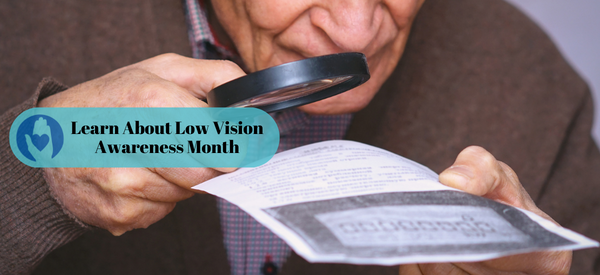February is Low Vision Awareness Month
This month is the month to check in on your visual health! Millions of people suffer from visual impairment and it’s often something else that could be causing it. For example, age-related macular degeneration (AMD) is a leading cause of vision loss in people who are 50 years old or older, according to the American Academy of Ophthalmology. More than 2.9 million Americans age 40 and older have low vision.
What To Look Out For
If you’re experiencing vision difficulties this may be a sign of low vision. You can notice this if you are having difficulty driving or reading. Daily tasks might take a lot of visual effort and cause headaches. Sometimes there may be the appearance of small yellow deposits called drusen, which form under the retina. Vision loss can progress slowly or quickly. When it progresses quickly you might see tiny new blood vessels grow under and into the retina. These blood vessels often break because they are so fragile, which is what leads to large amounts of vision loss. Feel free to ask your friends, family, or personalized elder care to help you look out for any symptoms.
A Way Forward: Visual Rehabilitation
While visual impairment can make daily life and everyday tasks such as driving, reading, or cooking more difficult, there is good news. There is such a thing as visual rehabilitation. This is not the usual solution to vision issues, such as glasses, contacts, surgery or other standard treatments. So be sure to ask your certified caregiver or doctor about any issues you may be having with your vision. You may require special attention through visual rehabilitation.
How to Take Care of Your Eyes
Ways to help your vision is to seek medical attention without reservation. There is a way to help. For more details on visual rehabilitation, here are some examples of what it looks like:
- Employment and job training
- Assistive products, like lighting and reading stands
- Technology, like magnifiers and screen readers
- Daily living and independent living skills trainings
- Emotional support, like counseling or support groups
- Transportation and household services
How to Get started with Rehabilitation Services?
Talk to your doctor or health care team. Freedom Home Care is happy to help in this process. Your eye doctor can connect you with resources or you can look into resources on your own. Several websites have lists of organizations that provide vision rehabilitation services. The easiest thing would be to talk to those that care for you about a way forward. Talk to someone today!




